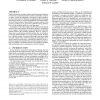108 search results - page 14 / 22 » Agents that Learn to Explain Themselves |
SOFSEM
2007
Springer
15 years 5 months ago
2007
Springer
In this work we assume that there is an agent in an unknown environment (domain). This agent has some predefined actions and it can perceive its current state in the environment c...
IJCNN
2008
IEEE
15 years 5 months ago
2008
IEEE
— When an agent observes its environment, there are two important characteristics of the perceived information. One is the relevance of information and the other is redundancy. T...
109
click to vote
AMEC
2003
Springer
15 years 4 months ago
2003
Springer
Digital information economies require information goods producers to learn how to position themselves within a potentially vast product space. Further, the topography of this spac...
103
click to vote
ATAL
2009
Springer
14 years 9 months ago
2009
Springer
Today's society is largely connected and many real life applications lend themselves to be modeled as multi-agent systems. Although such systems as well as their models are d...
GECCO
2007
Springer
15 years 5 months ago
2007
Springer
Imagine a group of cooperating agents attempting to allocate tasks amongst themselves without knowledge of their own capabilities. Over time, they develop a belief of their own sk...

